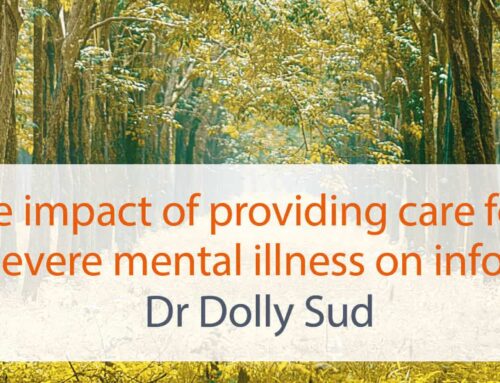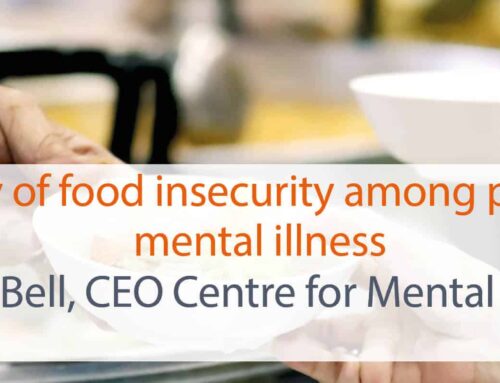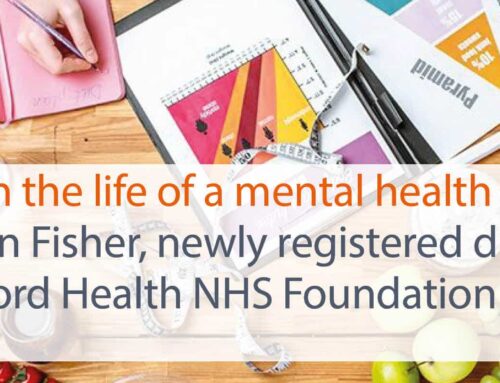
Gaby Hasham, Senior Recovery and Outcomes Project Officer, Rethink Mental Illness
On Tuesday 16 June, Rethink Mental Illness published the second of its COVID-19 briefings, based on its survey of 1,434 people in April and May1, looking at the impact of the pandemic on the physical health of people with severe mental illness.
In the survey, over half of respondents said that they had been exercising less and eating less healthily during lockdown.
“My mental health has been badly affected as I am unable to go out. I joined a new gym in January and was walking to it every day (4km). I now have no structure in my life.”
54% of people said they had been exercising less than normal in lockdown. Reasons for this included their usual gyms and pools being closed or due to low motivation or mood caused by mental ill health or lockdown. 79% of respondents said that their mental health had become worse during this time.
“[it is]…too overwhelming to try and visit big stores so shopping randomly when I feel I can at the local garage which is costing a lot more and buying more unhealthy food so that it has a longer shelf life than fresh”
51% of respondents said they had been eating less healthily during lockdown. Many people reported that they had struggled to book the supermarket slots specifically designed for vulnerable people and were reliant on neighbours or volunteers. Others were anxious about visiting their usual bigger stores and so were reliant on smaller, local shops with fewer ‘healthy’ choices.
Rethink Mental Illness are concerned that the lockdown restrictions, while taken for good reason, will have a long term, negative impact on the physical health of people with severe mental illness who already die on average 15 to 20 years earlier than the general population from preventable health conditions2. These are often caused by side-effects of medication, such as weight gain, or factors that help people to manage their illness, like smoking.
“I cannot get face-to-face appointments with my GP, so it’s harder to explain my physical health problems”
NHS England committed in the Five Year Forward View for Mental Health for 60% of people with a severe mental illness to receive an annual physical health check by 2020/21.3 This routine check should be made up of six key elements including weight and blood pressure measurements, lifestyle advice and blood tests e.g. for Type 2 diabetes. It spots potential problems early and saves lives.
Yet in the 12 months to the end of 2019/20, only 36% of people on GP severe mental illness (SMI) registers had received all six elements of the health checks4. Barriers include a lack of awareness among those with SMI that they are eligible for a check, a lack of collaboration between health care systems and a culture where checks are simply seen as a tick box exercise.
Coronavirus has placed the NHS under huge pressure. At the start of the outbreak in March, steps were taken to stop the NHS from being overwhelmed – including minimising less important reporting on targets, like the physical health checks target. As lockdown eases, it is vital that NHS England reconsiders its guidance so that meeting targets for physical health checks is re-prioritised.
The survey has demonstrated the importance of listening to those with lived experience in discussions around severe mental illness and physical health, now more than ever.
Overall, Rethink Mental Illness’ briefing recommends:
- Solutions around improving the physical health of people with SMI should include existing evidence of what works best for this group: Rethink Mental Illness is a proud partner of Equally Well UK, a collaboration of organisations with a shared aim to improve the physical health, quality of life and life expectancy of people with long term mental health conditions. The lessons from this partnership, as well as the Health and Wellbeing Alliance and Mental Health & Smoking Partnership, show that people with lived experience of SMI want their physical health support to be positive, empowering, and take a whole person approach
- Physical health checks for people with severe mental illness are delivered as a priority now that lockdown is easing, and the targets for these are reinstated
- Guidance to raise awareness of the importance of these checks is co-produced between experts by profession and experts by experience to address the barriers to people with severe mental illness receiving them.
Please find the full briefing on Rethink Mental Illness’ website here.
- Online survey by Rethink Mental Illness of 1434 people with severe mental illness in April and May 2020
- Royal College of Psychiatrists. 2013. Whole-person care – from rhetoric to reality: Achieving parity between mental and physical health
- NHS (2014) Five Year Forward View
- NHS (May 2020) NHS Physical Health Checks for People with Severe Mental Illness May 2020, Q4 2019/20






